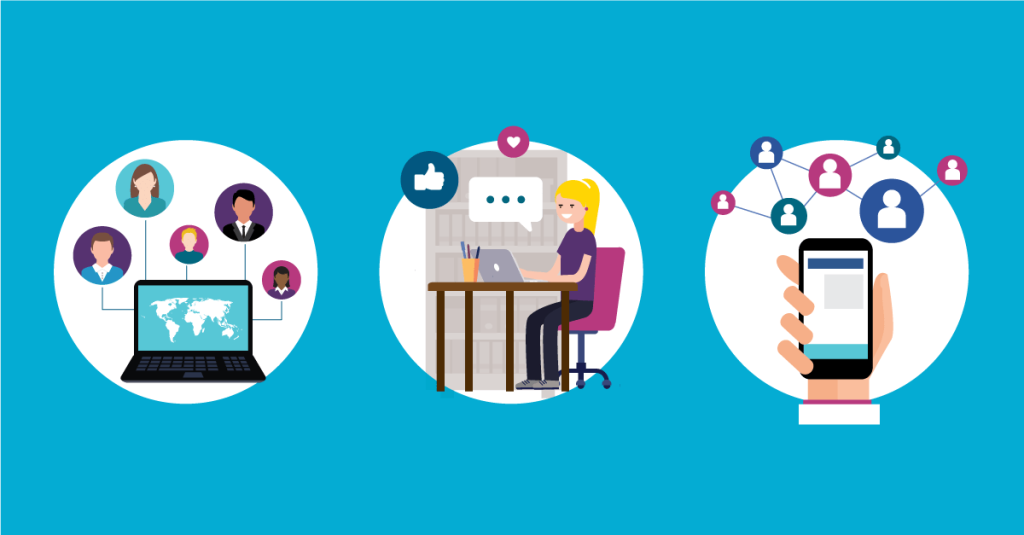-
When we think of social media, Instagram stories, Snapchats, and endless Facebook scrolling often comes to mind. Yet according to the Pew Research Center, 77 percent of workers report using social media while at work. While this data may lead you to believe that worker productivity has been hindered by Pinterest and its cousins, there are actually a handful of surprising reasons why social media plays an important role in the workforce.
It’s not whether social media in the office is good or bad; rather, it’s how employees use it. This article will delve into the pros and cons of social media in the workplace and share a list of suggested company policies to ensure it is used in the best way.

While surveys are prone to bias (it’s hard to admit you scroll through Twitter on your laptop to mentally escape the piles of work in front of you) these stats highlight some interesting ways people engage with social media to do their jobs.
-
Social media in the workplace: The pros
Here are some reasons why social media can be beneficial to both employee and employer.
- It gives you a mental break
This is by far the biggest reason people use social media at work. While it may raise some cause for concern, we’re also not engineered to sit in front of a computer monitor for eight hours a day. Giving your mind a break from whatever spreadsheet, Google Doc, or presentation you’re working on can allow your brain to hit the reset button and get back to work feeling better. Is social media the best way to take a break? No. But it can be beneficial to spend a few minutes looking at something fairly mindless. - It helps you make and support professional connections
LinkedIn is technically a social media platform, but it’s for professionals. Employees often use LinkedIn to create business leads, research employees at other companies, or learn about competitors and peers in the space. Making connections on LinkedIn can help foster partnerships, recruit new employees, and find mentors, too. - Social media allows you to ask questions and get answers
Depending on your field, you may encounter a problem you don’t know the answer to, but your followers or friends on Facebook, Twitter, or Instagram may. Social media gives us instantaneous information, and people are quick to respond on certain platforms. For example, a writer can use Twitter to see if people are willing to be interviewed for a story. - It helps strengthen personal relationships at work
Trusted friendships with office peers often leads to better work outcomes. It can also help you feel psychologically and physically healthy at work. Permitting coworkers to engage with one another on social media helps employees get to know each other on a more human level. That said, it’s a good idea to keep your social media engagement with one another mainly outside work hours. - You can use it to share content about the company
If your company’s social media plan includes sending out a press release, announcing a new website, or sharing the latest blog post, using employees to share the news on their personal channels will get more eyes on what you’re posting.
- It gives you a mental break
-
Social media in the workplace: The cons
Social media can also become problematic in the workplace and decrease productivity. The main issue? It can be distracting. A small mental break is fine, but it’s also easy to fall down the rabbit hole and get sucked from one social media post to another. Connecting with a coworker or lead on LinkedIn can quickly lead into a long string of subsequent searches that may have nothing to do with your job. That’s not the worst thing that can happen, but it’s definitely not an ideal scenario for an employee, especially if you’re up against a looming deadline.
Secondly, social media can become an issue if employees post something that reflects poorly on the company. If someone’s Twitter bio links to the company they work for and they tweet unlawful or unkind information, it looks bad for the company. The lines between personal and professional personas are blurred, and it’s especially tricky to navigate. That’s where a social media policy comes into play.
-
Your company social media policy
Workplace social media policies help employees know exactly what they can and can’t do on social media while they work for a specific company. It’s also important from a legal perspective; without a policy, your company could face legal issues or public relations nightmares.
Every social media policy will look different depending on the type of organization you are, the number of employees you have, and where you are headquartered. Here are some guidelines to consider when creating your own policy.
- Proprietary off-limits information
You should specify and put in writing anything your employees are not allowed to post on social media, including customer receipts, notes from internal meetings, and photos of or information about new products that haven’t yet been released. - HQ office photos
Some companies choose to be private about their headquarters. If there are offices or buildings that don’t allow photos to be taken (and shared on social) this information should be included in your policy. - Posts on personal feeds
This one is tricky, since employees technically have the right to post whatever they want on their own accounts. Some employees protect themselves by writing “views are my own” on their bios, but sometimes it’s not enough. One smart course of action is to remind employees that whatever they post online reflects both their personal and professional brand, whether they like it or not. A social media policy in writing helps reiterate that point. - Privacy settings on Facebook, LinkedIn, Twitter, and Instagram
Employees should know they can set their Facebook, Twitter, and Instagram (sorry LinkedIn) accounts to private, should they want to avoid mixing work with their personal lives. Remind them that they can change these settings so everyone feels comfortable. Consider including brief instructions in your policy.
- Proprietary off-limits information
-
Conclusion
Social media is a tricky topic in the workplace and definitely has its fair share of pros and cons. While it’s probably impossible to ban social media all together, there are ways to ensure workers use it to benefit both the company and productivity.
Is social media in the workplace a good thing?
- by Kristen Ghergich
- Published on December 28, 2018
- Office Tips



